Clarifying the Realities of Ambulatory Detoxification
Ambulatory detoxification is a critical first step in the journey toward recovery from substance abuse. However, misconceptions about the process can create unnecessary barriers for those seeking help. This article aims to clarify these myths, shedding light on the realities of detox and the comprehensive support systems in place to aid recovery.
Myth: Detox is a Simple and Quick Process
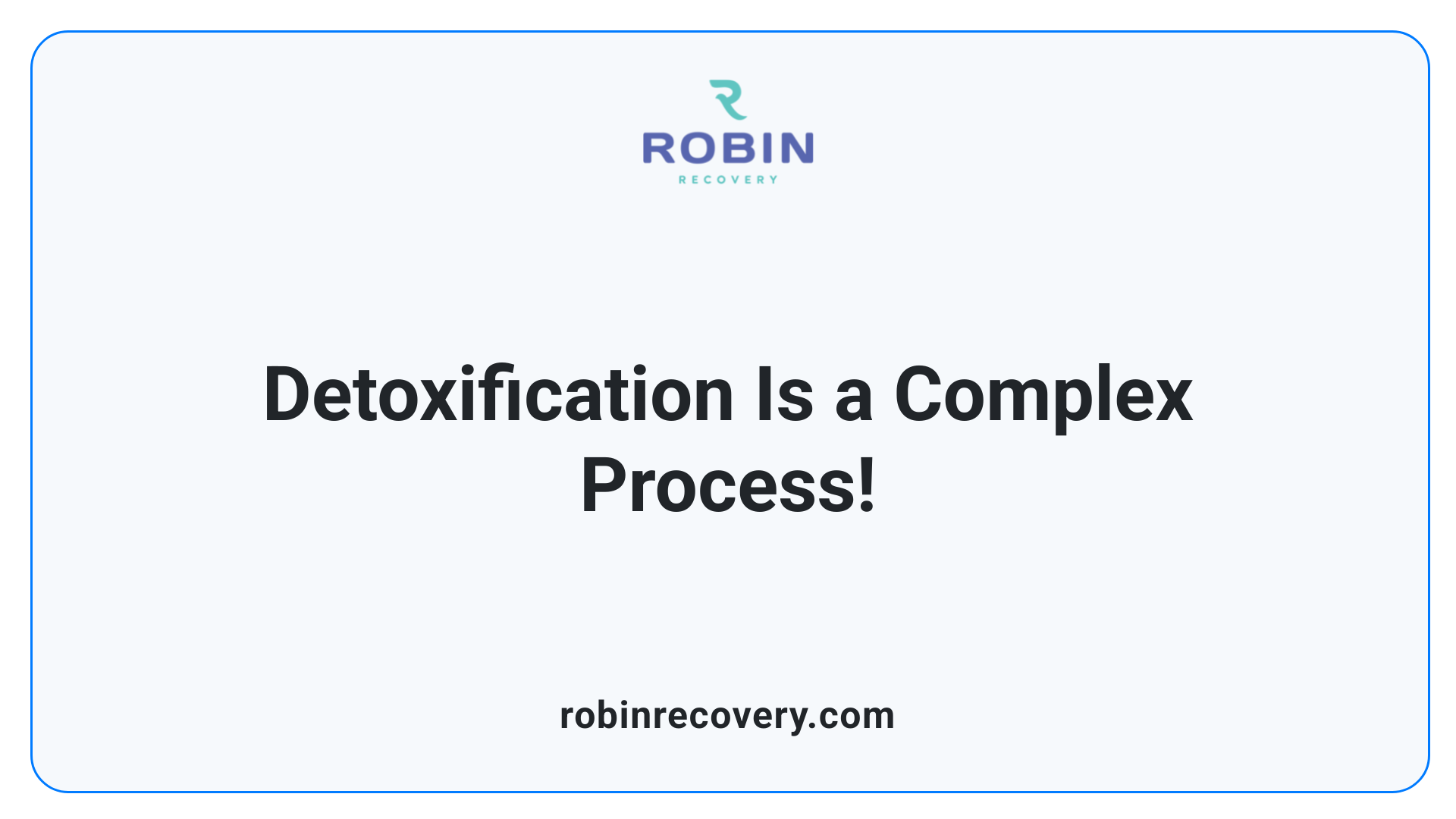
Detox Duration Varies Based on Individual Factors
Detoxification is often perceived as a quick fix for alcohol dependence, but this is far from the truth. The duration of detox varies greatly depending on several individual factors, including the frequency and amount of alcohol consumed, any existing medical conditions, and a person's nutritional status. For many, the detox process can take several days to weeks, illustrating that it is anything but a simple endeavor.
Withdrawal Symptoms Can Range from Mild to Severe
While some may assume that withdrawal symptoms are manageable, the reality is that they can range from mild discomfort to life-threatening complications. These symptoms need careful monitoring by medical professionals to ensure safety during the detox process. Addressing withdrawal effectively requires a supportive environment, underscoring the importance of not attempting detox without professional help.
Misconception That Detox is Quick and Simple
The notion that detoxification is a straightforward and rapid endeavor overlooks the complexities involved. Detox is the first step in a much larger recovery process that requires time, effort, and significant support. Professional detox programs not only aid in managing withdrawal symptoms but also prepare individuals for the next phase of treatment, which is crucial for long-term sobriety.
| Aspect | Reality | Impact on Recovery |
|---|---|---|
| Duration of Detox | Varies based on individual factors | Could last several days to weeks or more |
| Withdrawal Symptoms | Ranges from mild nausea to severe complications | Requires medical supervision to ensure safety |
| Recovery Support | Vital for sustaining long-term sobriety | Increases chances of success post-detox |
What is the success rate of detoxification?
The success rate of detoxification varies among individuals and programs. According to SAMHSA, approximately 68% of people who complete drug and alcohol detox programs view their treatment as successful. Additionally, between 85% to 95% of those who complete a rehab program report being drug-free nine months later, suggesting that while detoxification is a crucial first step, the overall recovery process contributes significantly to long-term success. Recovery rates improve among those utilizing support services, with around 17% of the 22.3 million Americans in recovery having accessed these resources. However, it is important to note that the relapse rate for drug addiction can be as high as 60%, highlighting the challenges many face even after detoxification and treatment.
Myth: Home Detox Without Professional Help is Safe
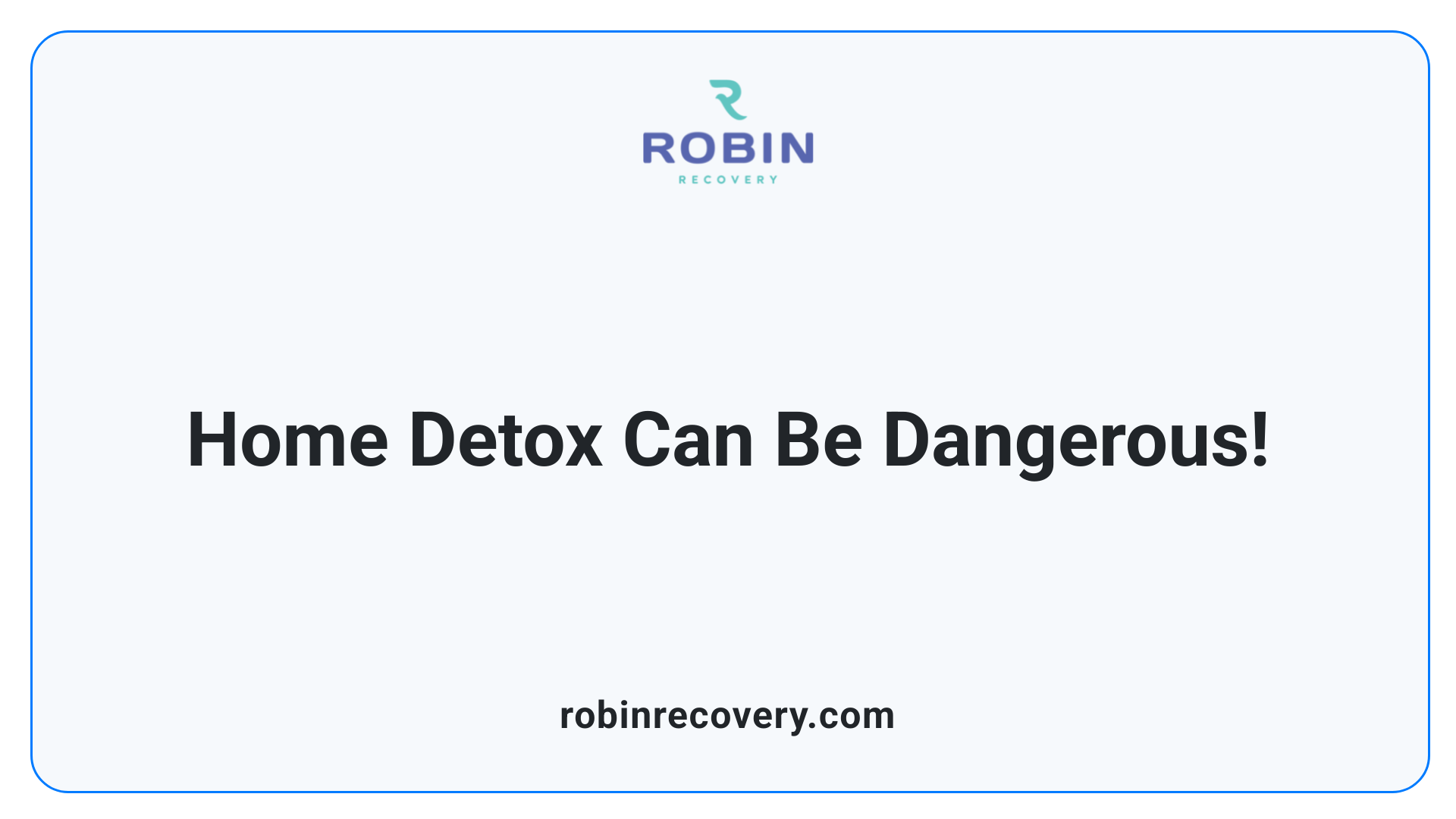
Dangers of home detox
Detoxing from alcohol at home poses significant risks, primarily due to the unpredictable nature of withdrawal symptoms. While some individuals may experience mild symptoms such as anxiety or insomnia, others can suffer life-threatening complications, including seizures and delirium tremens (DTs). Without medical oversight, the severity of withdrawal can escalate quickly, making conditions like these highly dangerous.
Importance of medical supervision
Medical supervision during detox is crucial to ensure safety and effectively manage withdrawal symptoms. Detox programs usually provide 24/7 monitoring by healthcare professionals who can recognize complications early and provide necessary medical interventions. This level of care is absent in home detox scenarios, where individuals may not have immediate access to vital resources or support.
Comprehensive support for safety during detox
Enrolling in a professional detox program not only offers medical help but also a comprehensive support system. This includes psychological support and access to medications to ease withdrawal symptoms. Such a structured environment enhances the likelihood of a safe and successful detox, setting a foundation for ongoing recovery.
Myth: Detoxification Solves Addiction
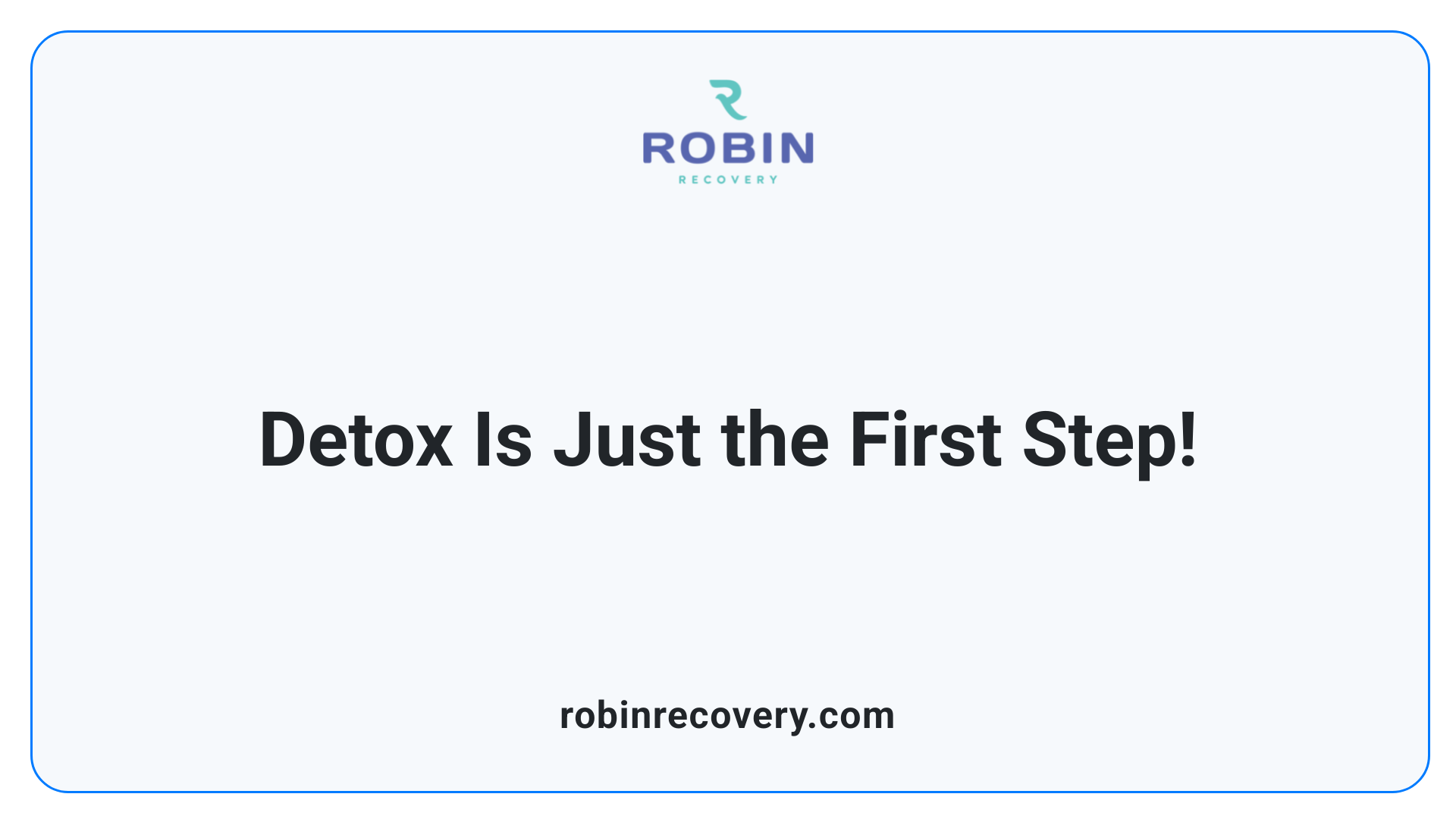
Detox is only the first step in recovery
Detoxification serves as the initial phase in the journey towards recovery from alcohol or substance abuse. This vital process focuses on allowing the body to eliminate harmful substances and manage withdrawal symptoms. However, it is crucial to understand that detox alone does not provide a comprehensive solution to addiction.
Role of comprehensive treatment programs
Following detox, more extensive treatment programs are essential to address the psychological and behavioral factors contributing to addiction. Comprehensive treatment may include individual therapy, group counseling, and support for co-occurring mental health disorders. Such programs facilitate deeper healing and equip individuals with strategies and coping mechanisms essential for lasting sobriety.
Continuing care and aftercare
The recovery journey doesn't end with detox or even the completion of a rehab program. Continuing care and aftercare services, including alumni programs and regular counseling sessions, play a significant role in preventing relapse. Engaging with ongoing support helps individuals maintain their sobriety and develop healthier patterns of living, fostering an environment for sustained recovery.
Myth: Withdrawal Symptoms Are Easily Managed Alone
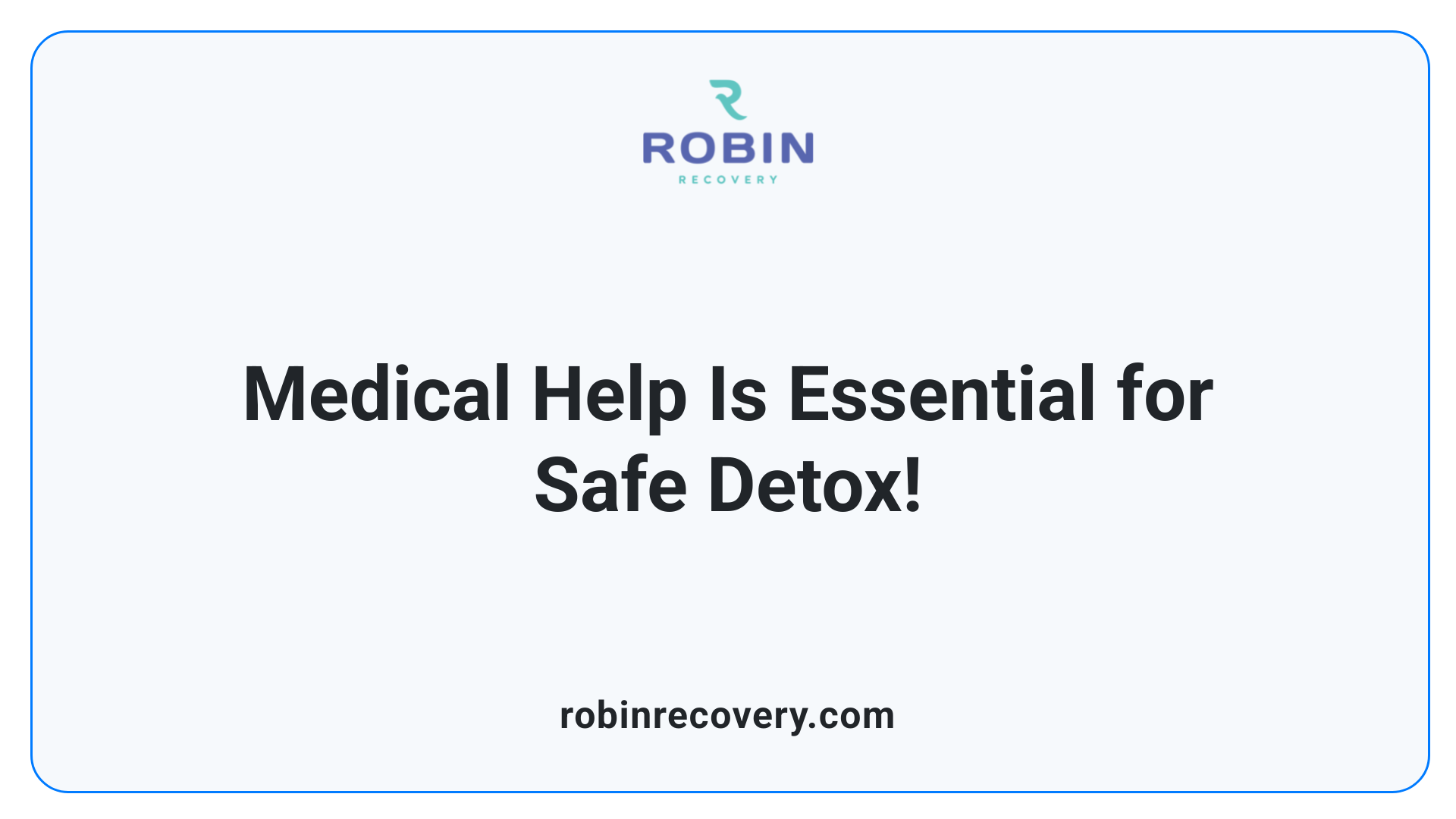
Dangers of unmanaged withdrawal symptoms
Many individuals believe they can manage alcohol withdrawal symptoms on their own, but this can lead to serious health risks. Withdrawal symptoms can escalate quickly from mild anxiety and nausea to potentially life-threatening conditions such as seizures or delirium tremens. Attempting detox without medical supervision increases the likelihood of severe complications.
Medical intervention in managing withdrawal
Medical professionals play a vital role in the detox process. They provide around-the-clock monitoring and can implement medication-assisted treatment, which can significantly ease withdrawal symptoms and enhance safety. This medical intervention is crucial for managing both the psychological and physical aspects of withdrawal effectively.
Common withdrawal symptoms during detox
Withdrawal symptoms vary widely among individuals. Common experiences include:
- Anxiety: Feelings of restlessness and panic can occur.
- Nausea and vomiting: Physical discomfort can impair the individual’s ability to stay hydrated.
- Sweating and tremors: These symptoms can lead to serious dehydration.
- Seizures: Severe cases may see seizures begin within 24-48 hours of last use.
Given these risks, medical supervision is not just beneficial; it is essential for anyone undergoing detox.
Myth: Detox is Only for the Wealthy
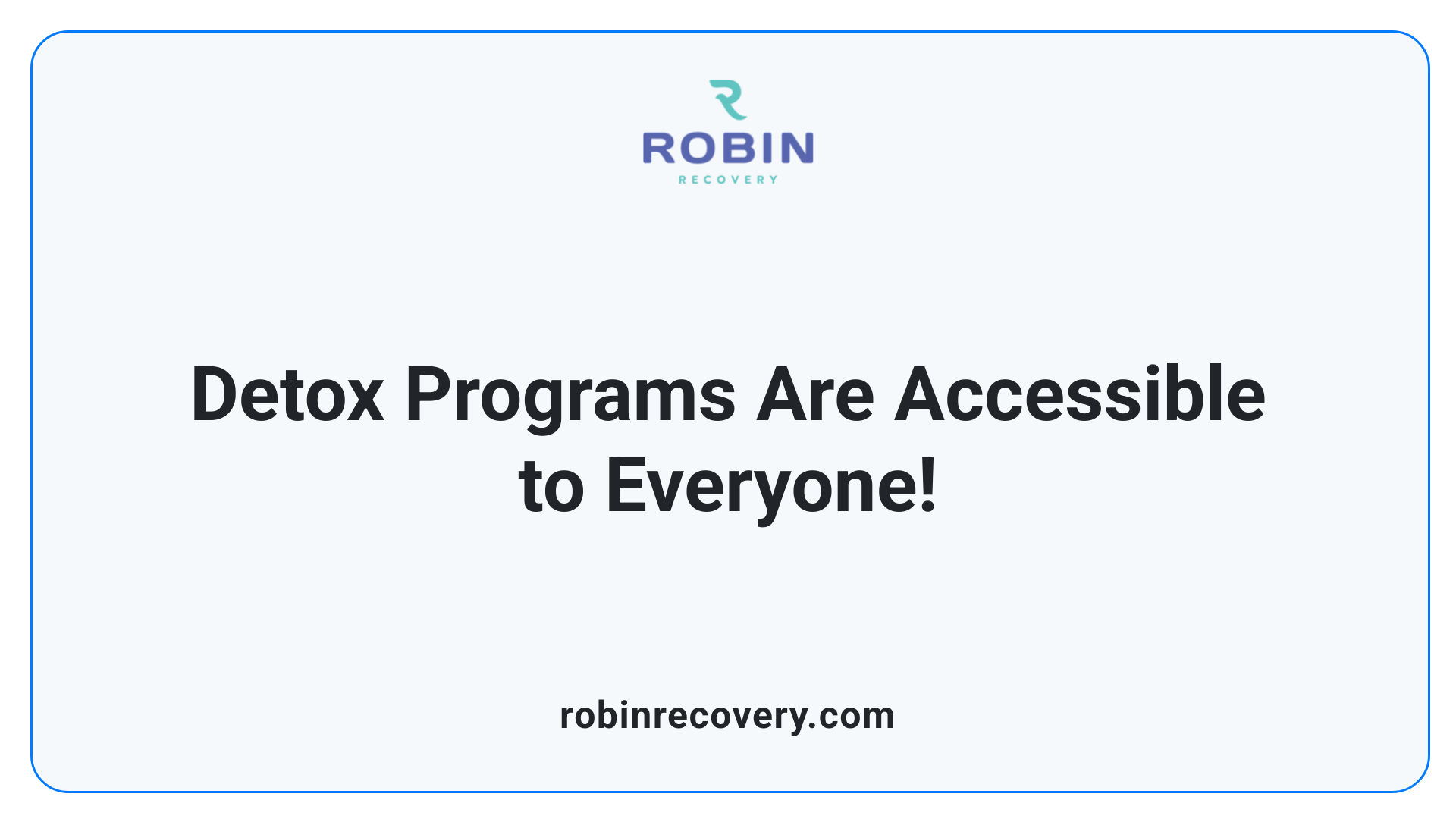
Accessibility of Detox Programs
The belief that detox programs are exclusive to wealthy individuals is a widespread misconception. Many facilities offer effective treatment options that cater to people from various financial backgrounds. Rehabilitation centers recognize the need for accessible care, making strides to incorporate flexible payment plans and support for those facing financial challenges.
Insurance Coverage and Financial Aid Options
Most insurance plans under the Affordable Care Act include substance abuse treatment as a covered benefit. This coverage can significantly alleviate the financial burden associated with detox programs. It's essential to check with your insurance provider to understand the specifics—and navigate necessary authorizations.
Affordability Through Sliding Scale Payment Plans
In addition to insurance coverage, many detox facilities offer sliding scale payment plans based on a patient's income. This approach ensures that even individuals with lower financial means can receive the help they need. By opting for such plans, treatment becomes not only accessible but also financially manageable.
| Aspect | Detail | Importance |
|---|---|---|
| Accessibility | Programs for all income levels | Ensures options for diverse financial backgrounds |
| Insurance Coverage | ACA benefits include treatment costs | Relieves financial burden for those seeking help |
| Sliding Scale Payment Plans | Fees adjusted based on income | Makes care attainable for individuals facing economic challenges |
The stigma surrounding addiction treatment as a luxury can hinder individuals from seeking help. Understanding the financial options available is crucial for anyone considering detox.
Myth: Privacy Concerns and Stigma in Detox Programs
Privacy protections under HIPAA
Individuals often worry that seeking help for alcohol addiction will lead to public exposure. However, detox and treatment for substance abuse are protected under the Health Insurance Portability and Accountability Act (HIPAA). HIPAA ensures patient confidentiality, meaning that treatment information can only be disclosed with consent. This legal safeguard allows patients to pursue recovery without the fear of unwanted exposure.
Reducing stigma associated with seeking help
The stigma surrounding addiction can be a significant barrier to recovery. Many mistakenly perceive addiction as a moral failing, which can lead to shame and reluctance to seek treatment. Education and advocacy are essential in breaking this cycle. Public awareness campaigns are increasingly reframing addiction as a disease, encouraging individuals to seek professional help early rather than waiting for a crisis.
Discretion in modern detox programs
Recent advancements in detox programs emphasize confidentiality. Many facilities offer discreet services, enabling patients to receive necessary care while maintaining their privacy. Additionally, outpatient detox options allow individuals to continue their daily lives, which can alleviate concerns about public knowledge of their treatment efforts.
| Aspect | Details | Benefits |
|---|---|---|
| Privacy Protections | HIPAA safeguards patient confidentiality | Helps patients feel safe in seeking care |
| Stigma Reduction | Education on addiction as a disease | Encourages early intervention |
| Discretion in Detox | Outpatient options and discreet facilities | Maintains normalcy while receiving help |
The Essential Role of Support and Aftercare in Recovery
Importance of ongoing support post-detox
Once detoxification is complete, the journey to recovery is far from over. Individuals transitioning from detox benefit immensely from ongoing support. This support can come from therapy sessions, support groups, and community resources, serving as a safety net that fosters lasting sobriety.
Resources for long-term sobriety
Recovery is bolstered by various resources available to those in need:
- Counseling Services: One-on-one therapy helps address psychological barriers to recovery.
- Support Groups: Groups like Alcoholics Anonymous (AA) provide peer support.
- Sober Living Environments: These communal living situations offer a supportive community that prioritizes sobriety.
- Aftercare Programs: Structured programs designed to assist with the transition back into daily life can significantly enhance recovery outcomes.
Relapse prevention strategies
Preventing relapse is a crucial aspect of recovery. Effective strategies include:
- Identifying Triggers: Awareness of situations or emotions that lead to cravings can help individuals avoid relapse.
- Developing Coping Skills: Engaging in healthy coping mechanisms instead of returning to substance use is essential.
- Routine Check-ins: Regular follow-ups with counselors can help maintain accountability and foster connections.
Understanding the necessity of aftercare and support ensures that recovery is sustainable and fulfilling.
Toward an Informed Understanding of Detoxification
Ambulatory detox is a vital component of recovery, dispelling the myths surrounding it is crucial for encouraging individuals to seek help. Understanding that detox is a medically supervised, comprehensive process can help alleviate fears and misconceptions. By emphasizing the importance of ongoing support, accessible treatment, and the multifaceted nature of recovery, we can foster a more informed and compassionate approach to addiction treatment.
References
- Debunking 4 Common Detox Myths - Paramount Recovery Centers
- Drug Detox Myths - Michael's House
- Debunking Common Myths About Detox and Addiction Treatment
- 8 Myths About Addiction Treatment
- 12 Common Myths about Drug Treatment Programs - Harris House
- Debunking Common Myths About Addiction
- Inpatient Detox Facility Myths, Debunked - Serenity Grove
- Debunking Myths About Addiction Recovery - Gateway Foundation
- Common Myths About the Drug Detox Process - Ascendant New York
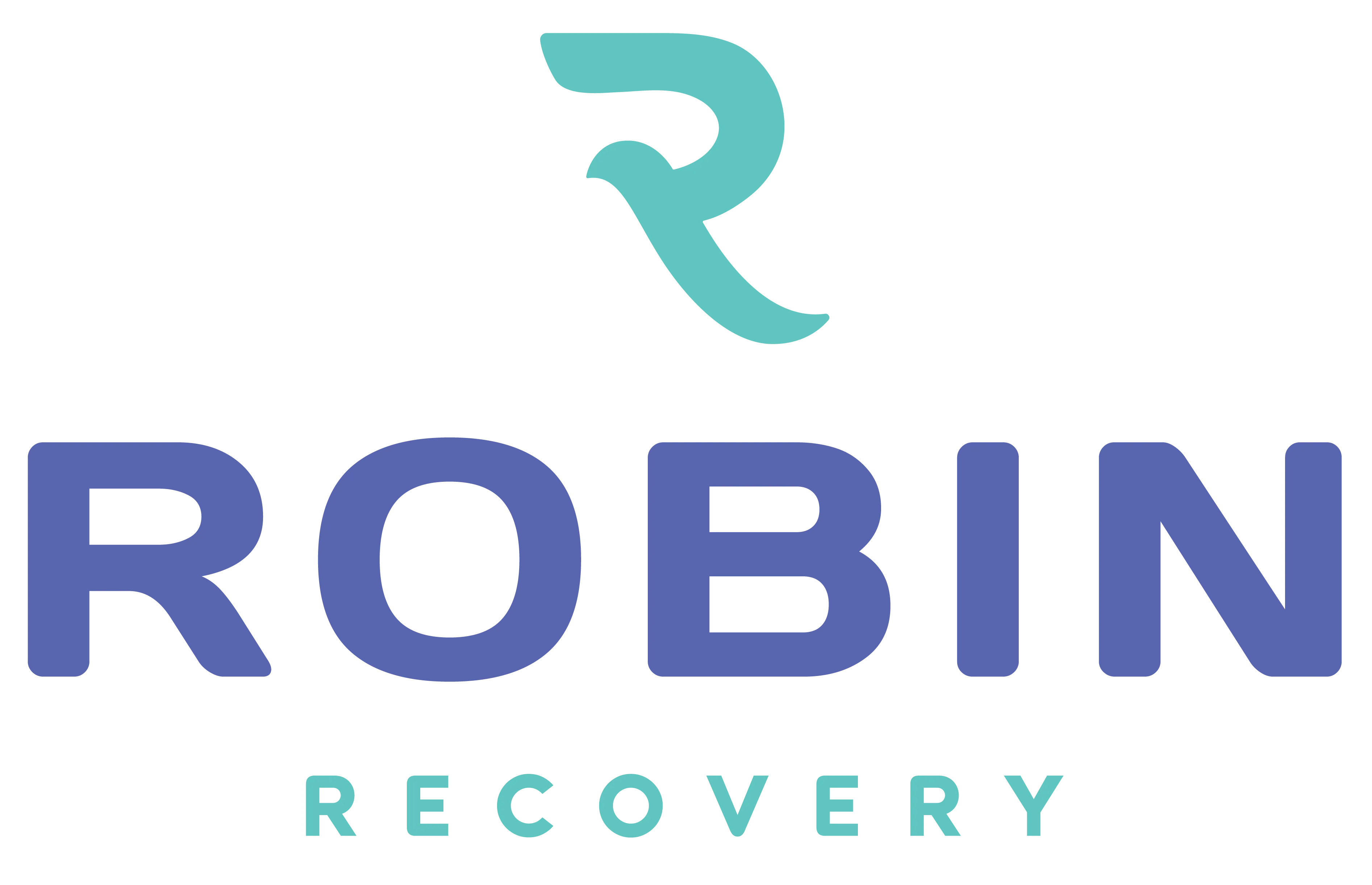
.svg)

.svg)

.svg)
.svg)






































































































